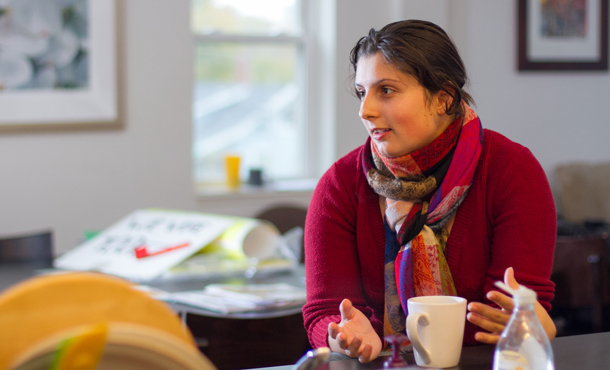[Editor’s note: The following Mother’s Day reflection was written by Rebekah Enns, a 2013 EMU graduate, during her junior year when she was participating in the Ministry Inquiry Program sponsored by Mennonite Church USA.]
The second Sunday of May. May 13, 2012. International Mothers Day. A day to thank the women who bore us and raised us. A day of celebration.
I have noticed Mother’s Day come and go several times. I pride myself on never forgetting the culturally mandatory, and always rewarding, phone call to my mother, even when she is across the globe. Often I call my grandmother and single aunt as well – they too have been mothers in my life.
This year, however, I was struck by how Mother’s Day, with its focus on gift giving and flowers designed both to empower the economy and praise feminine domesticity, losses sight of the character of mothering.
I celebrated Mother’s Day with “The House of Peace,” a church community run through Fourth Street Community Fellowship (Virginia Mennonite Conference) for the impoverished and homeless of inner city Washington D.C. In honor of the occasion, Reverend Sang Jin Choi asked members to share testimonies about their mothers in place of a message.
As I reflected on my own mother – the wonderful woman who, along with my father, raised my two siblings and me, cared for us, encouraged us, loved us, and inspired us, and who I was looking forward to calling that afternoon – I listened to stories of other mothers from this community. Some of them were strong women, mothers who struggled with alcoholism and abusive husbands and persevered, mothers who fought racial prejudice to put food on the table, mothers who cared for all the children in the neighborhood. And other mothers, mothers who never said I love you, who were weighed down by their circumstances and unable to continue caring for their children, grandmothers who raised their grandchildren when mothers left or died. Each story, personal and heart wrenching, was received with applause and tears.
In response, Rev. Choi compared a mother’s unconditional love to God’s love; a mother’s caring embrace to the image of God’s wings of protection around us; a mother’s drive to provide for her children with God’s promise to care for the world. I reflected on the stories of those who had never felt their mother’s love, never been surrounded by their mother’s caring embrace, never been cared for or provided for by their mother.
At the end of the service, Rev. Choi asked all the mothers to gather at the front of the room for a photo. When I did not stand to join them, a man sitting near me asked if I was not a mother. I answered with a smile and a shake of my head. His response: “You better get working on that.”
Honestly, I was taken aback. I am 20 years old, just finished with my junior year at college, nowhere near ready to have children – if I ever do decide to. And then I began to reflect. “You better get working on that.” Working on being a mother? What does it mean to be working at motherhood? To work at being a mother? To work at mothering?
An older woman sat me down on Saturday “for a little love time.” Holding my hand, she encouraged me to have faith, to trust God, and not become discouraged when I could not see the answer to my problems. She gave me a few hugs before moving on. I had never met her before.
At church on Sunday, one elderly woman offered encouragement to all the young black men. In front of the whole congregation, she encouraged them, in the difficult world in which they live, to make healthy, good decisions on behalf of their communities. And then she commanded the rest of us present to do the same, whenever we encountered a young man.
Another woman, younger, known to the community as Deaconess Paula, encouraged people to be advocates to those in power instead of fighting within the community. On this day for “mothers of the past, current mothers, and mothers of the future,” the Deaconess encouraged the whole community to make change happen. “Here’s to us. Because it’s a long road, a very long road, and I don’t want to see us fighting each other no more. I want us to make this a better place for our children.”
For me, these were all examples of mothering. Women dedicated to encouraging, inspiring, and nurturing those around them, regardless of blood relation. In a community where sometimes biological mothers are not up to the task of raising children, others take on the responsibility of embracing, of providing, and of reflecting God’s unconditional love to everyone around them.
The man sitting next to me during the service was right. In honor of Mother’s Day, the style of mothering I saw demonstrated by women is this community is something I “better get working on.”
